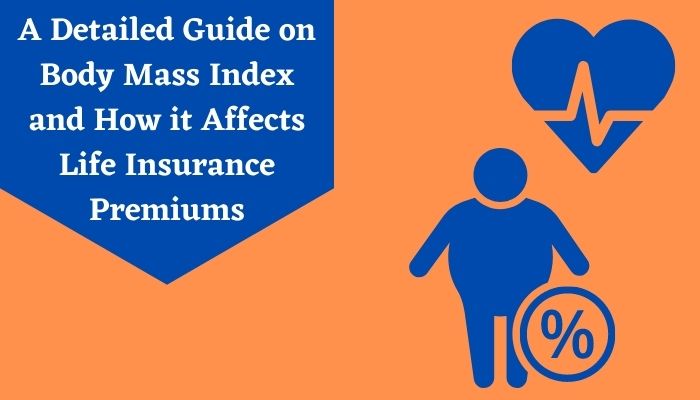A Detailed Guide on Body Mass Index and How it Affects Life Insurance Premiums
Fitness is one thing that can be easily lost by sitting idle at home for a long time. Due to the pandemic and the lockdown confinement, many of us lost our fitness. This, in turn, affected the premium rates of the term insurance plan. So, how can fitness affect our term insurance premium? This is because of the BMI or Body Mass Index of an individual. We advise you to set some fitness goals for yourself to save yourself from paying higher premium rates.

Why are we saying that fitness or BMI affects the insurance premium rates? For this we want you to first understand BMI meaning.
What is the meaning of BMI?
BMI or Body Mass Index is a type of measurement that idealizes the weight of a person according to his/her height. As per a general rule, any individual with a BMI higher than the normal range is considered obese and vice versa. You can get in-depth knowledge about BMI meaning by consulting any dietician.
How to Calculate the BMI?
BMI can be calculated using different factors like an individual’s age, height, weight, and gender. It hardly takes a few minutes to calculate a person’s BMI or Body Mass Index. The basic formula for Body Mass Index Calculation is as follows:
BMI = Weight (kgs)/ [Height (m)]2
Medically, it is normal to have a BMI ranging between 18.5 and 24.9. The following BMI Chart will help you understand better:
|
Body Mass Index (BMI) |
Category of Weight |
|
Below 18.5 |
Underweight |
|
Between 18.5 to 24.9 |
Normal Weight |
| Between 25.0 to 29.9 |
Overweight |
|
Above 30.0 |
Obese |
What is a Body Mass Index Calculator?
Apart from the BMI calculation formula that we just shared, there is an easy-to-use BMI Calculator App available online that makes this calculation pretty simple. Most insurance companies use apps to calculate the BMI of a person interested in purchasing a life insurance policy. These BMI calculator apps also show a full BMI chart for the reference of the user.
Why is BMI important for a Term Plan?
Based on the BMI calculations, a person may be categorized into any of the four categories: Underweight, Overweight, Normal weight, and Obese. According to medical experts, if a person is underweight or obese, there are more chances of suffering from severe health issues. Although, Body Mass Index is not the only criterion that affects the premium rates of a term plan, yet these days, many insurance companies consider it. It is majorly considered to be a health risk indicator by the insurers.

People with high BMI are more prone to suffer from ailments like type-2 diabetes, gallbladder disease, cardiac issues, and even untimely death. Alternatively, people with a low BMI are considered to be suffering from malnutrition. They are more prone to suffer from a low bone density issue, joint pain which might lead to osteoarthritis, and so on. Naturally, no insurer wants to insure a person who may suffer from any of the above-mentioned ailments. This is where a BMI Calculator plays a vital role in determining the exact BMI of a person who is eager to get a term plan policy.
How can BMI affect your Life Insurance Premium?
By calculating the BMI of a person using a Body Mass Index Calculator, the insurer can easily determine the health status of a potential policyholder. Therefore, BMI often acts as a guideline on which the rate of life insurance premium may depend. The main reason that was given by insurance companies to support BMI as a health indicator is as simple as follows.
Various insurance companies take it for granted that a person with a high BMI will need to get more frequent medical facilities as compared to the one with a normal BMI. As a result, the higher the chances of medical expenses, the higher the premium for a term insurance plan.
Is BMI the only Health Indicator used by Insurance Companies?
It’s true that nowadays, more and more insurance companies rely on BMI as a health indicator for a person interested in buying a policy. However, this doesn’t mean that BMI is the only way to check health status.

Let’s have a look at some of the other factors that can help indicate the health status of a potential policy buyer:
- Age: A lot about the health status of a person can be determined by his/her age. It is a general trend followed by many insurance companies to offer term plans with a low premium to younger people. It is because they are less likely to suffer severe health issues. This goes vice versa too. People over the age of 40 years are more prone to suffer health issues and therefore they often get policies with a higher premium rate.
- Family History: Besides, the age, the family history of a person can also throw ample light on the health condition. Medical experts believe that more than the BMI it is the family history that often indicates the health status of a person. A person with a family history of diseases like diabetes and Parkinson’s is more likely to suffer from the same in near future. Therefore, the insurance companies often ask for a detailed report of family history before they finalize the premium rates for a policy.
- Lifestyle/ Addictions: A lot can be predicted about the health condition of a policy applicant by his/her lifestyle. Insurance companies tend to set higher premium rates for a term plan for people addicted to tobacco or alcohol. Heavy alcohol drinkers and tobacco consumers are most likely to get insurance policies with higher premium rates.
The Conclusion
Although, the issuance of a term insurance plan is not solely dependent on your BMI value, yet a lot can be predicted about your health status through it. As we mentioned just a while ago, besides the BMI, various other factors are taken into consideration by the insurance companies to set the premium rates. So, make sure to get the exact information from the insurance company before buying a policy to prevent policy rejections.





























